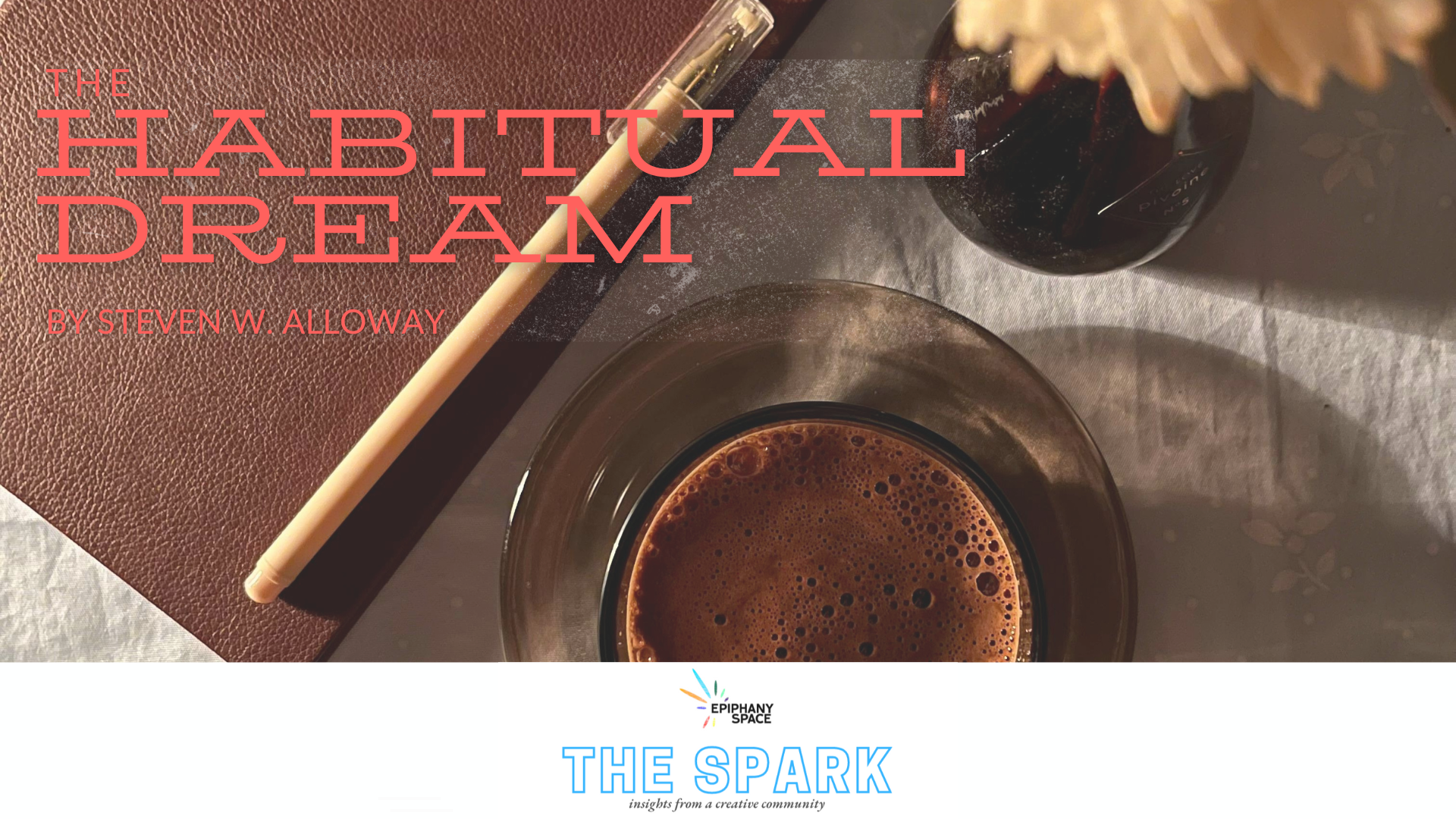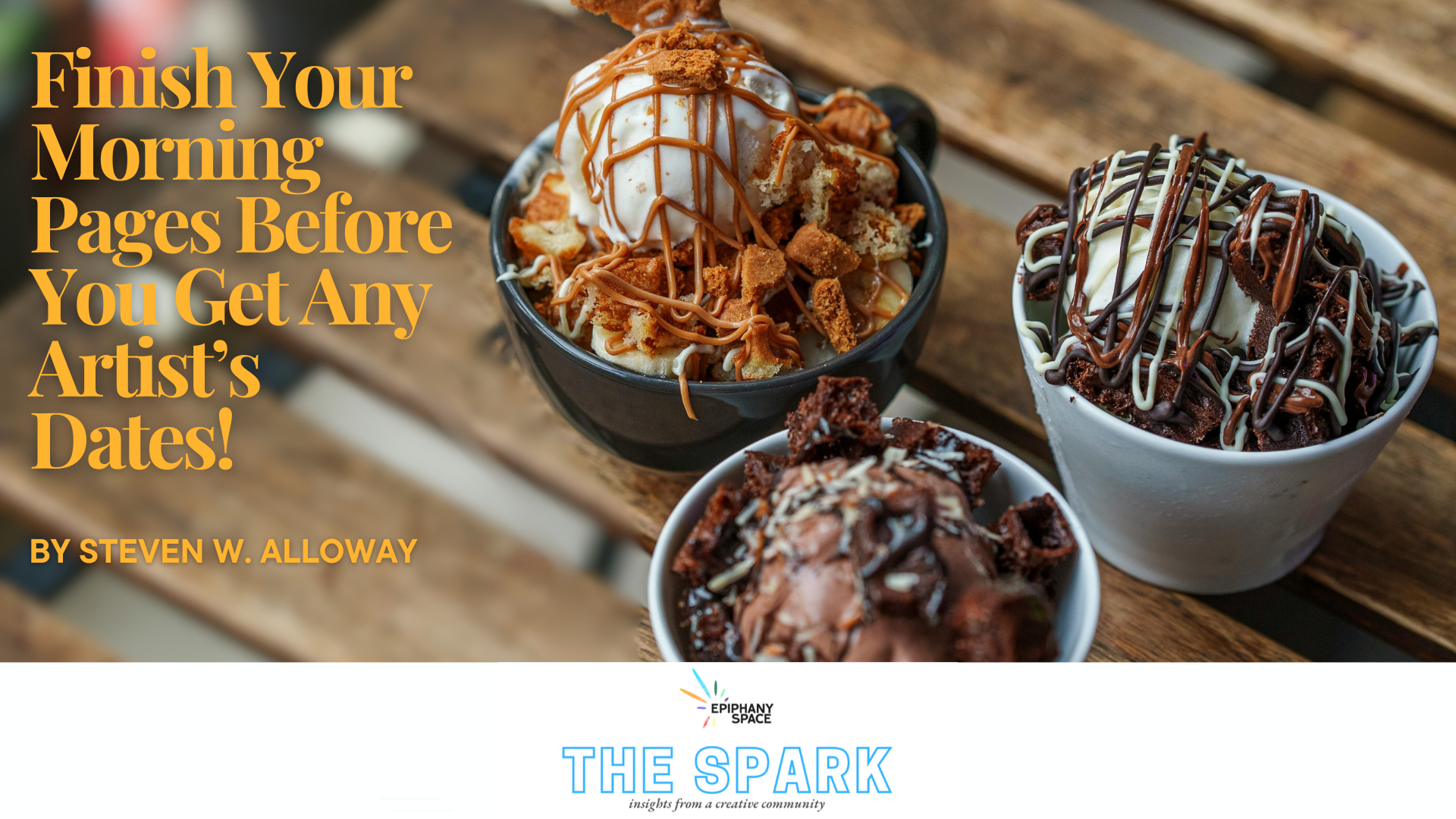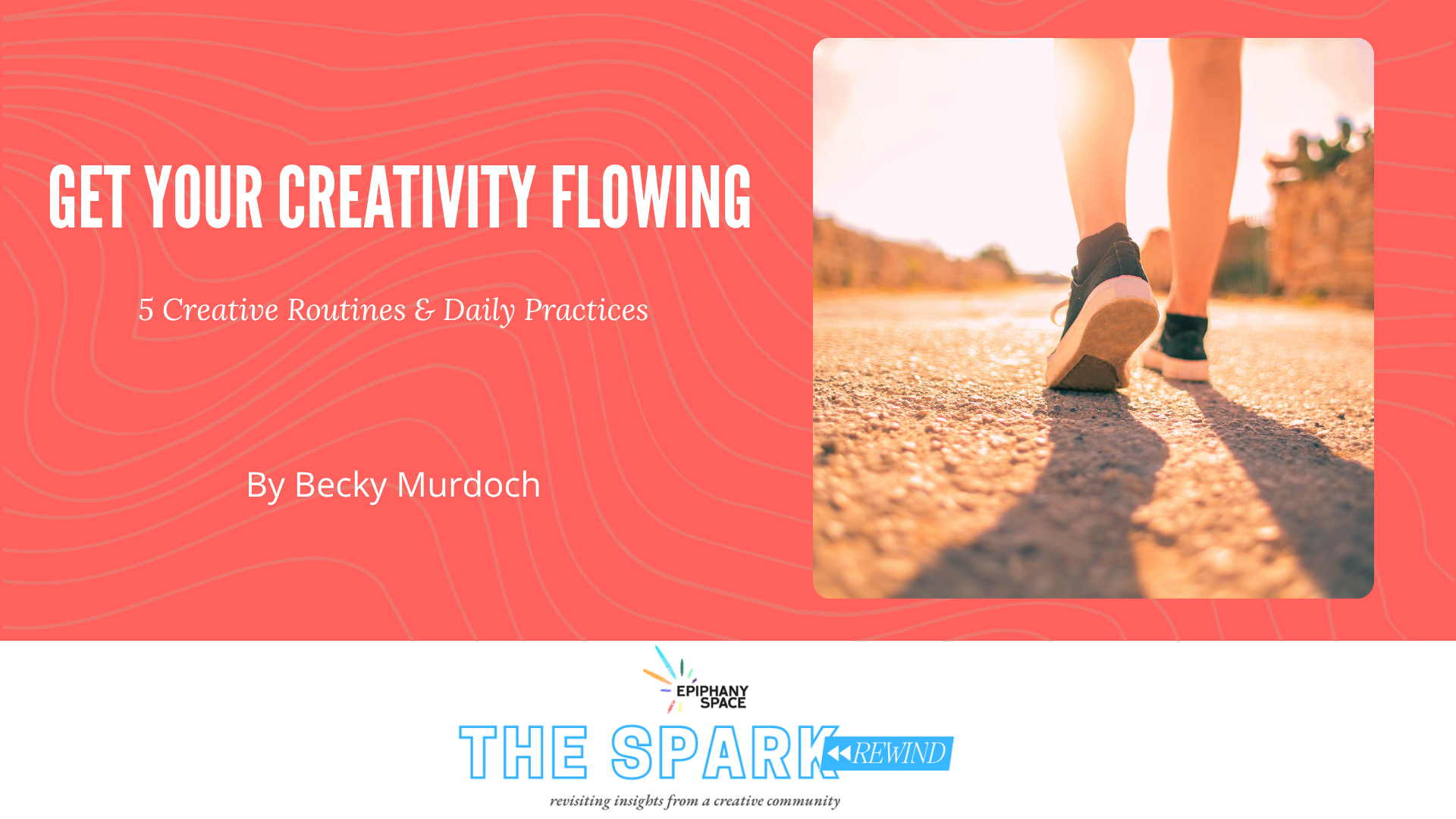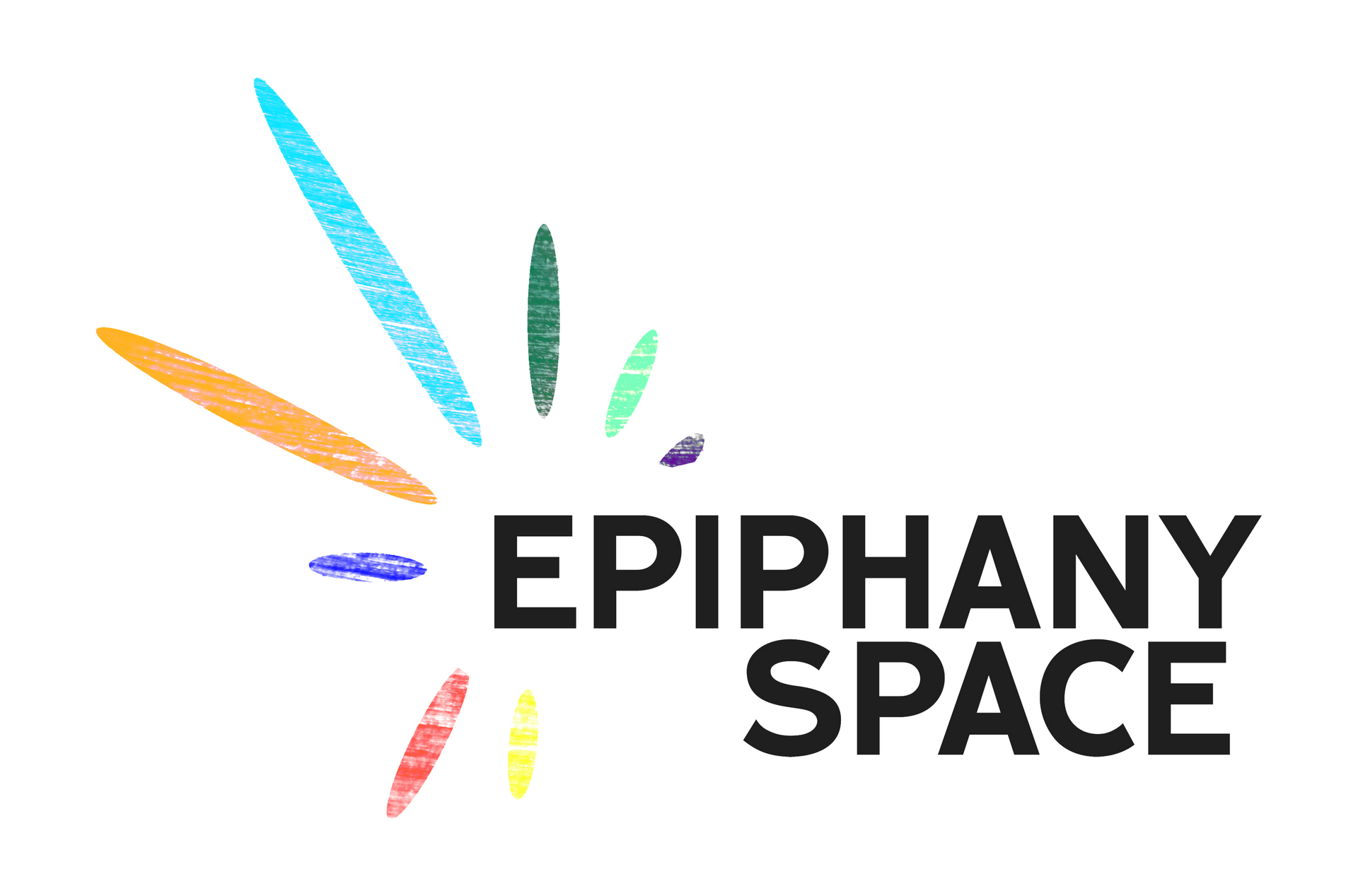Article
Your Foolproof Guide to Overcoming Creative Blocks (Guaranteed or Your Money Back) | By Steven W. Alloway | Part 2
Your Foolproof Guide to Overcoming Creative Blocks (Guaranteed or Your Money Back) (Part 2)
By Steven W. Alloway
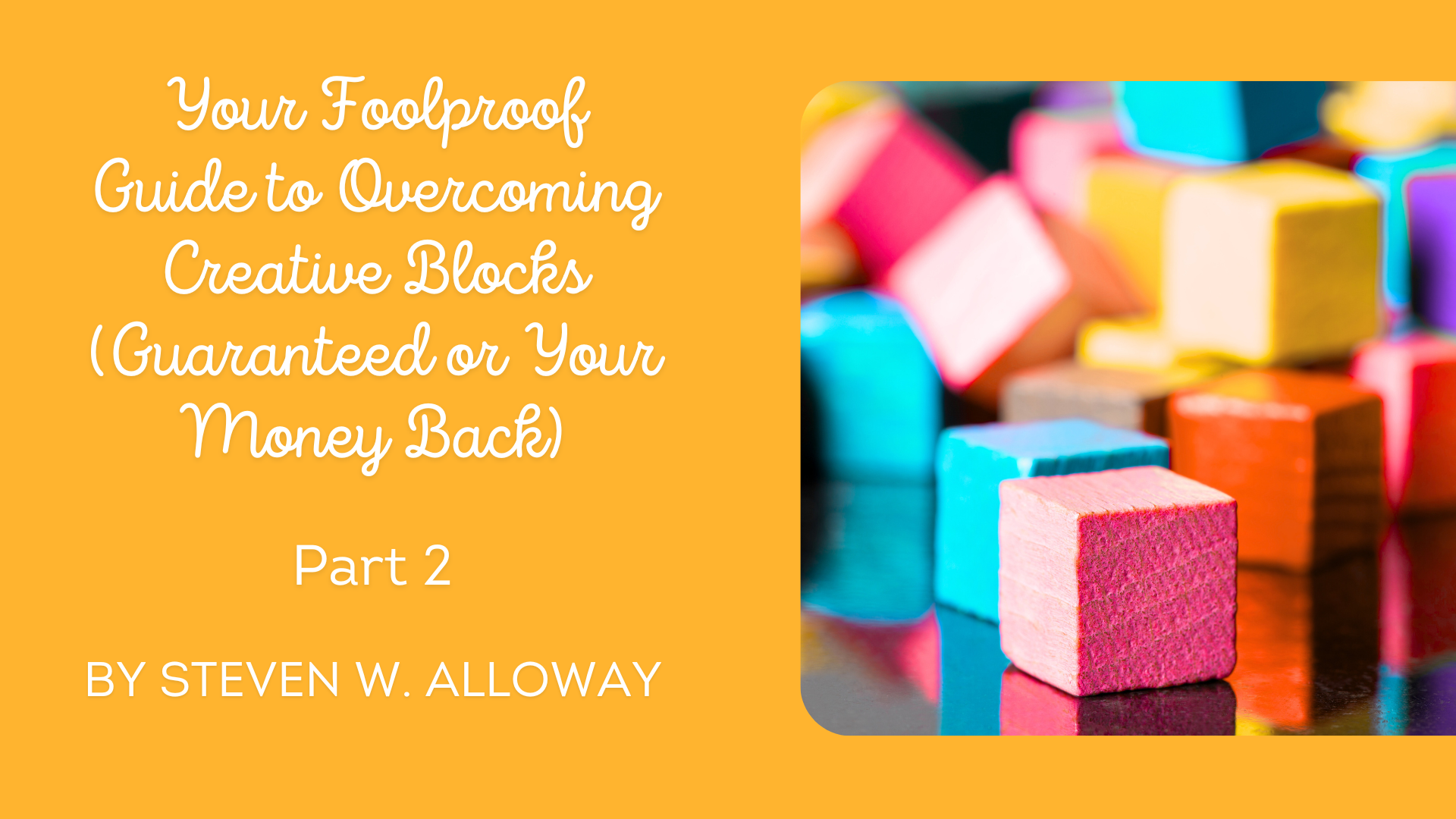
4. Something About Artist Dates
I’ve brought up artist dates multiple times in previous articles. But let’s talk about why they’re important. You can’t create in a vacuum. Creating things comes from learning things, doing things, and experiencing things.
However, when I’m working on a big, important project, particularly if there’s a deadline, the tendency is to sit in my office at my computer all day, until it’s done. I don’t have time for side quests or frivolous excursions. I’ve got work that needs to get done! But of course, that mentality is one of the fastest paths there is to a creative block.
Personally, I find scheduling artist dates to be difficult. I know that they can encompass almost anything, but I always feel like it should be something fancy and cool: an outing to some out-of-the-way place, an attempt to do something new and exciting… some sort of adventure. And making time for an adventure isn’t always easy, especially when I’m feeling creatively blocked.
But when you’re feeling bogged down, coming out of the rut isn’t always so much about having new experiences as getting a fresh perspective. Or just getting out of the house. This is why walking helps. After looking at your computer screen for hours, even just a walk around the block gives you something new to look at, something different to do, and something else to think about. Doing this can clear your head and open up your mind, making it easier for the ideas to flow.
Even just a little bit of fresh air and sunlight can help. In fact, they’re necessary to both your physical and mental wellbeing.
So what I’m saying is, if you’re staring at the blank page before you, open up your dirty window. Let the sun illuminate the words that you could not find. Or, if there isn’t any sun, then maybe feel the rain on your skin. In fact…
5. Release Your Inhibitions
(Yes, that last section was written specifically around the song lyrics to Unwritten by Natasha Bedingfield, in order to build up to this section. Both tips are still valid and important, though. I make no apologies.)
My junior year of college, I took a semester of Improv. I’ve always been terrible at improv. I’m a writer. I’m not clever and funny in the moment; I’m clever and funny after several minutes of careful consideration. Nonetheless, I took the class and even did a couple of shows with the Improv team that semester.
And in doing that, I learned something: it’s not about coming up with something clever and funny. It’s about coming up with something. In improv, you don’t have the luxury of careful consideration. You don’t have time to craft the perfect line of dialogue. You reach out for whatever is there, and you put it on the stage. And once you’re able to let go of the uncertainty, of the second-guessing, of the inhibitions… You’ll find that there’s always something there. Moreover, it’s often something you never would have come up with if you’d taken the time to craft something “good.”
In the years since, I’ve found that this is true of creative blocks in just about any field. You’re not stuck for an idea. You’re stuck for a good idea. You’re stuck for an idea that you like. If you abandon that notion of coming up with something good and just reach out for whatever’s there… Something will be there.
So am I saying that, when you’re creatively blocked, you should just settle for creating something that’s not as good? Of course not. I’m saying that, once you have an idea to work with, in most cases, you can take the time to refine it and make it good. Not only that, but sometimes those uninhibited, “out there” ideas can be legitimately great ideas and lead to incredible work—if you’ll let them.
Unfortunately, this is another one that I’m still struggling with, myself. I know, logically, that it’s true, and I’ve experienced it plenty of times, but somehow I still get bogged down in trying to find the “right idea” and not finding anything that measures up. This is one of the reasons why looming deadlines tend to be an important part of my creative process—and why I so frequently find myself scrambling to meet them.
In fact, this very thing happened to me just last year. A group I’m part of announced a call for submissions for an anthology of time travel stories. Which, if you know me at all… An opportunity like that is like Christmas and my birthday rolled into one.
I had about a month until the submission deadline. And fairly quickly, I actually came up with a really good idea. It involved the apocalypse, a time traveling criminal underworld, and a world’s fair. I was really excited about this idea, and I started working on it immediately—
And then I stopped just as quickly, because nothing I was coming up with seemed any good. I had an idea of what the story was, but every decision I made seemed like the wrong one, and every sentence I wrote was an uphill battle.
Finally, the day of the deadline came, and I had only a few paragraphs of what I had planned to be a 10 or 15 page story. Even with a sudden, massive burst of creative energy, there was no way this story was getting done in time. So I had a decision to make. I could give up for lack of anything to submit, telling myself (as I often do) that it’s better to take the time and do it right than to scramble to create something subpar just to meet a deadline… Or I could scramble to meet the deadline. Come up with another idea, on the spot, write a (much shorter) story, finish it by the cutoff time (9pm that evening), and submit it.
I really struggled with the decision, and for a brief time, I did tell myself that not scrambling was better. But in the end, I chose the second option. I went on a frantic search through a myriad of old files, some going back decades, to try to find an idea that would work as a time travel story. Not a good idea, but just any idea.
Eventually, I found some very brief notes for a series of letters to a time travel advice column. Or rather, some notes for one letter to a time travel advice column, along with the subsequent note, “This could be a whole series!”
And then, finally, the massive burst of creativity came. I wrote the story over the course of an afternoon and evening, building one idea on another and not really having a clue where it would end up until I finished. Which I did, and submitted the story literally seconds before the deadline. There was no time for second-guessing, no time for refining, no time even for proofreading. It was just a matter of getting it all on paper (or computer screen) before the clock ran out.
Now,
Kali Anywhen is published in an anthology… And my amazing “apocalyptic, crime syndicate, world’s fair” idea is still just a few paragraphs in a document on my hard drive. I’m very proud of Kali Anywhen. Soldiering on with a new idea was definitely the right decision, and I’m glad that that was the one I ultimately went with.
But at the same time, I can’t help but wonder… If I had attacked my first idea with the same frantic fervor that I had with the advice column idea… If I had approached it that way from the very beginning… Would that have been the story that ended up finished in an anthology? Of course, there’s no way of knowing what might have been. But the story is still there waiting for me, to find out what could be…
OK, we’ve reached number 5, so I guess that wraps up our—oh, wait. I skipped number 2. Oops. I guess I still need one more idea. Where am I going to come up with another idea for getting over creative blocks?
2. There Are Ideas Everywhere
In order to get over a creative block, you need ideas. You need inspiration. But I have good news for you. There is literally an infinite supply of both, all around you. Let’s try an experiment: Reach for the nearest book to you right now. It could be fiction, nonfiction, narrative, academic, or even a reference book. (In fact, I’ve found reference books work really well for this exercise. So do catalogues.) Whatever the book is, pick it up and flip through it. Chances are, within five minutes, you’ll come across something in it that sparks your imagination.
You can also do this with music, movies, TV shows, online articles and blogs… Or virtually anything else. One of my favorite resources for inspiration is Newspapers.com. The subscription is a little pricey, but if you have the means, it’s well worth it. It gives me access to literally millions of newspapers from all over the world, covering several centuries of history and culture. It’s great for research, particularly on historical projects, but it’s also great for browsing and finding ideas. You can browse news articles, but also opinion pieces, columns, advertisements, even comic pages. Just type in something related to your creative project and see where it takes you.
I also use cookbooks. Seriously, there are now three different cookbooks that I want to adapt into scripts. I’m not even sure how that happened. But cookbooks often reflect the lives of the people who wrote them and the time and culture in which they were written, both of which can provide great insights for kickstarting creative endeavors.
So if you’re feeling creatively blocked… Just look around. Really look. Maybe pick up something you haven’t touched in awhile, or go a direction you wouldn’t ordinarily go. Don’t approach it as, “Is there a usable idea in this corner? How about in this one?” Just experience it—whatever it may be.
Take the opportunity to clear your head and gain a fresh perspective—much like you would with a walk, or with an artist date. And before long, the creativity will start seeping in, washing over you, and filling you with new ideas, new inspiration, and new directions to take your project. The blocks will be gone, and the creativity will flow.
Guaranteed, or your money back.

